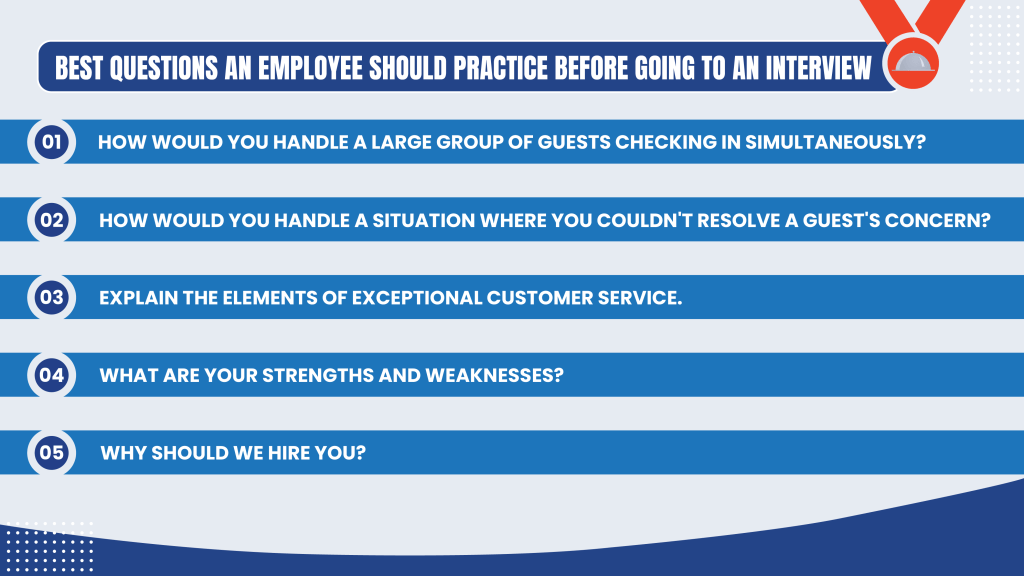
Hotel Job Interview Questions - 5 Important Questions You Need To Know
Nearly 10.5 million people are estimated to work in the international hotel and resort industry, with each unique role carrying different responsibilities. Although the details of interviews differ from one job in a hotel – such as concierge, chambermaid, or receptionist, among others – there are global commonalities and universal Hotel job interview questions that come up during your screening.
This paper attempts to illuminate these common investigations, revealing what interviewers are trying to discover and showing how respondents can answer those questions successfully. Realizing that no two interviews are the same, this discussion focuses on shared traits that connect different roles in the hospitality industry.
The right hotel interview requires more than just demonstrating technical skills and years of experience. Interviewers are interested in finding attributes such as flexibility, social acuity, and commitment to service that lie at the heart of success among employees working for dynamic hospitality institutions. So read on!
Hotel Interview Questions Overview
Several Hotel job interview questions determine the competence of candidates who desire to work in hotels and other tourism-related businesses. Although these questions go beyond the level of technical knowledge and experience, they focus on interpersonal skills, adaptability, and willingness to serve, which is crucial in the hospitality field where people are served.
The hotel interview questions are directed toward the candidate’s ability to deal with unexpected circumstances, articulate well, and follow a particular brand or establishment philosophy. As the hospitality industry relies heavily on good customer service, these questions measure the applicant’s potential ability to contribute positively in this area, which becomes crucial.
It is possible to get a high chance for a job if you prepare the questions well and have a deeper understanding of the interviewee’s mind so that you can show you are in a perfect position by giving broader answers. It not only provides an appropriate match between the skills of applicants and needs for job qualifications but also enables mutual coherence values in their connection with hotel-brand candidates.
These Hotel job interview questions in the interview are not just used for qualification assessment but provide an opportunity for both parties, namely the candidate and hotel, to meet their needs. Because hospitality is highly dependent on delivering excellent experiences, these questions play a significant role in helping locate individuals who are not only technically skilled but can also fit well within this hotels industry.
Best Questions an Employee Should Practice Before Going to an Interview

1. How would you handle a large group of guests checking in simultaneously?
Hotels and resorts experience fluctuating periods of busy and slow bookings. During peak seasons, reservations surge, often leading to sizable groups of guests checking in simultaneously. This situation can be challenging, testing your ability to ensure a seamless check-in experience for numerous guests simultaneously. Your response to this question is a gauge for your potential employer to assess your aptitude for managing high-pressure scenarios.
Example answer: It is important to ensure a smooth check-in process so customers can have positive initial impressions of the hotel company. In case there are several unexpected arrivals simultaneously, reducing waiting hours is of primary importance. Considering the high probability that numerous guests will arrive exhausted or frustrated, flawless communication and interaction become crucial.
Besides guest engagement, I would arrange additional welcome drinks and snacks for their comfort. In addition, I would uplift non-critical human resources to work at the reception desk, hence shortening the time of registration. I will work extra hours and shifts if necessary for operational efficiency during the peak tourist season.
2. How would you handle a situation where you couldn’t resolve a guest’s concern?
Regrettably, not every work situation allows for a perfect resolution. Interviewers posing this question aim to assess your commitment to ensuring guest satisfaction and your ability to respond to challenging requests.
Example Answer: During my initial role in customer service at my previous job in 3-star hotel, a customer ordered a menu item we didn’t offer. Politely, I explained the absence of the requested item and recommended an alternative from our menu. Although I tried to offer my suggestion that would bring satisfaction, the customer decided not to order anything and left. This experience taught me the importance of maintaining a positive demeanor and offering alternatives when faced with requests that cannot be fulfilled.
3. Explain the elements of exceptional customer service.
Customer service and satisfaction hold immense significance in the hospitality industry. This question aims to gauge your understanding of customer service and its key components. Craft a response defining customer service, outlining critical aspects, and detailing your commitment to delivering outstanding customer service.
Example answer: Customer service is presented in the hotel setting where direct and indirect assistance to customers before, during, and after their visiting are provided. This includes choosing appropriate rooms, managing reservations, changing the booking details, or making modifications to rooms and meals. It is only through exceptional customer service that guests and customers may be converted into loyal clients.
First-grade customer service means acting respectfully, and sensitively, with active listening skills and timely responses as well as continuous guest support. Not only reacting in a positive manner to their needs and wishes but also preemptively is crucial. This consists of identifying the customer, 24 hours a day service, offering an excellent first impression; soliciting feedback asking questions, and addressing unmet needs.
4. What are your strengths and weaknesses?
This question serves a dual purpose: to identify your areas of expertise and assess your self-awareness. Your interviewer aims to ascertain your ability to articulate specific strengths, possibly seeking qualities that complement the current team’s skill set. Similarly, in discussing weaknesses, your interviewer seeks proof of self-awareness, ensuring these limitations do not clash with the required job skills.
Example Answer: I am organized, attentive to details and effective in communication. These strengths have always played a significant role in my success as I effectively organize and manage the projects assigned to me, perform tasks with high accuracy levels, build efficient relations among team members throughout all stages of my career.
On the other hand, I must admit that one of my weaknesses as being critical to be myself. Although such a pursuit of perfection sometimes produces top-notch results, occasionally it causes wasting more time on an assignment than necessary. Nevertheless, I have been trying hard to strike a balance between reaching for perfection and better management of time so as to achieve efficiency in productivity.
However, recognising weaknesses is an essential component of self-development or career development and I am always looking for ways to improve in time management. This self-consciousness not only reflects my determination to improve but also guarantees the interviewer that his weakness does not contrast with the necessary skills for this particular job.
5. Why should we hire you?
One of the most common hospitality job interview questions asked – here, the interviewer wants to understand why you believe you are well-suited for the position. As you know yourself best, the interviewer expects you to pinpoint skills or experiences that closely match the background necessary for success in the role.
Example Answer: My particular mix of abilities and background precisely meets the needs of this hotel. I possess broad experience in hospitality management with a demonstrated ability to improve guest satisfaction and service delivery by minimizing operational costs. My real-life practice in supervising front-of-the-house services and my ability to organize proper staff training programs make me a perfect fit for increasing your hotel service level.
My passion for providing a pleasant and lasting guest experience is evident in my past jobs, where I always got good reviews and helped to increase customer satisfaction ratings. I am proficient in utilizing contemporary technologies to simplify hotel activities so that check-ins become smoother and efficiency improves. Second, my excellent interpersonal and leadership performance will allow me to create a positive team atmosphere as the hotel pursues its goal of excellence.
Beyond a passion for meeting and surpassing guests’ expectations, I am dedicated to ensuring your premier-quality institution enjoys longevity in success and continued growth. My attention to detail, customer focus, and proactive attitude can benefit your hotel’s performance.
Conclusion
The performance of a hotel job interview is not just limited to manifesting technical skills; it should reveal social competence, flexibility, and dedication to work. This discussion unravels timeless concerns within the hospitality sector, which stresses recognizing interviewers’ motivations. Interviewers aim to seek skills, crucial for succeeding, by asking complicated yet simple chef interview questions like handling a big inrush of guests, coping with tricky situations, specifying exceptional client service, and articulating strengths and weaknesses.